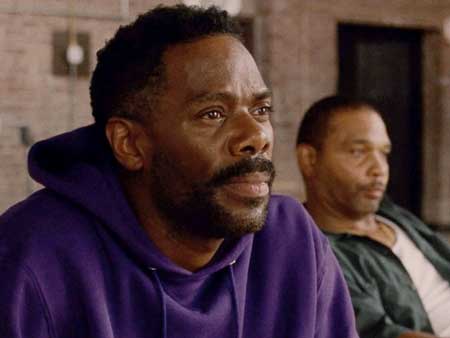Film (2023)
Directed by Greg Kwedar
Screenplay by Clint Bentley, Greg Kwedar
Music: Bryce Dessner; Cinematography: Pat Scola; Film Editing: Parker Laramie
With Colman Domingo (John “Divine G” Whitfield), Clarence “Divine Eye” Maclin, Sean San José (Mike), Paul Raci (Brent Buell), David “Dap” Giraudy, Patrick “Preme” Griffin, Jon-Adrian “JJ” Velazquez, Sean “Dino” Johnson

Clarence “Divine Eye” Maclin
Image: Courtesy of A24 Films
John “Divine G” Whitfield (Colman Domingo) is an older prisoner who comes across as cultivated, thoughtful, well-spoken and is the founder of the Rehabilitation Through The Arts program at Sing Sing prison. He and a group of other prisoners work on a new play together – an amalgam of myth, fantasy, Shakespeare, and mummies – to create a comedy to perform for other prisoners. The process of working on the play becomes the focus, with all the attendant issues – insecurity, rage, appreciation, mutual support.
The relationship between Whitfield and Clarence “Divine Eye” Maclin becomes focal, with Whitfield helping Maclin to settle down, not be provocative, take steps toward calming his heart and mind. At one point Whitfield says he knows that Maclin has a knife and encourages him to get rid of it. At another point, when Maclin uses the N word – both Whitfield and Maclin are black – Whitfield says we don’t use that word here – instead we use “beloved.” When, near the end of the film and time has passed and Maclin uses “beloved” to address Whitfield, one’s heart nearly breaks.
This rough and ready film is not scripted in a simple or straightforward way, but it is indeed very effective. Its dramatic focus hovers around Whitfield and it forces us to see the complexity of rehabilitation, particularly where the issue of misapplied prison sentences come to bear. There is a scene in which Whitfield is before the parole board and one watches the strings of despair being woven and tautened as he suffers the indignities and disappointments of the board’s responses to him.
The relationship between the two principal men is effectively dramatized – initially worrisome and on the edge of violence, and ultimately complex, connected, transformed. Though the subject-matter of the the film is putatively focused on the Rehabilitation Through The Arts program, its main subtext is about their relationship, which makes this an interesting variant of a buddy film. It doesn’t spell out all of the details of their backgrounds or relationship, but it gives enough perspectival viewing into each of their cases to make a potent story.
The film is courageously cast, with many real prisoners appearing in the film as themselves. Guys who look very intense are part of the Rehabilitation Through The Arts Program and are part of the film-acting crew and give the drama feeling of grit and authentic context, not at all put-on. These are indeed colorful characters, and they come across full of real grit.
Colman is a terrific actor who last year made a splash with his portrayal of Bayard Rustin in Rustin (2023). That was indeed a compelling performance, and he brings his considerable talents to bear in this quite different role as well.
The film is based on the actual and admirable work of the Rehabilitation Through The Arts program as recounted in a series of stories originally published in Esquire and New York magazines, now collected in the book Sing Sing Follies (A Maximum-Security Comedy): And Other True Stories (2024) by John H. Richardson. One can also learn more about the program online here.
Overall: A quirky, offbeat, but engrossing and moving, story that works its magic subtly and persuasively through what seems almost at points like a documentary but which ultimately is seen to have the shape of a very effective drama.
– BADMan (aka Charles Munitz)
Leave a Reply